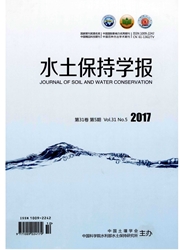

 中文摘要:
中文摘要:
雨水花园是结合城市景观,以滞留和净化雨水径流为主要功能的生物滞留处理系统,能够在一定程度上减轻城市化进程对城市水文和水质的负面影响。根据在西安市雨水花园蓄渗屋面雨水径流的现场试验,确定在各种暴雨条件下,花园设计及土壤入渗能力不同时,雨水花园拦蓄雨水径流的能力以及花园溢流的时间和溢流量。结果显示,黄土具有良好的入渗能力,达到2.346m/d;在较为湿润的2011年基本没有发生溢流,汇集的雨水径流全部入渗补给了地下水。对于某一重现期的暴雨,雨水花园溢流总量受到降雨强度和历时二者叠加效果的影响。
 英文摘要:
英文摘要:
Rain gardens are bioretention systems that are designed with urban landscaping and used for retaining and purifying urban stormwater runoff.Rain gardens can mitigate the adverse impact of urbanization on hydrology and water quality.This paper presented an experimental study on the infiltration capability of a rain garden constructed in Xi'an,China.Time and volume for overflow in the rain garden under storms of variable duration and recurrence interval were calculated.The results showed that the loess soil in Xi'an area had a good infiltration capacity,the average value of the measured infiltration rates was 2.346 m/d in the rain garden,nearly all stormwater runoff collected in the relatively wet year of 2011 infiltrated and recharged to the groundwater.For storms of a specified recurrence interval,rainfall intensity and the duration were two controlling factors that caused overflow in the rain garden.
 同期刊论文项目
同期刊论文项目
 同项目期刊论文
同项目期刊论文
 Calculating actual crop evapotranspiration under soil water stress conditions with appropriate numer
Calculating actual crop evapotranspiration under soil water stress conditions with appropriate numer Remote sensing temporal and spatial patterns of evapotranspiration and the responses to water manage
Remote sensing temporal and spatial patterns of evapotranspiration and the responses to water manage Estimation of evapotranspiration using a remote sensing model over agricultural land in the North Ch
Estimation of evapotranspiration using a remote sensing model over agricultural land in the North Ch Impact of Urbanization on Rainfall-Runoff Process in a City: the Flood from 8 to 9 August 2007 in Xi
Impact of Urbanization on Rainfall-Runoff Process in a City: the Flood from 8 to 9 August 2007 in Xi Development of a soil-plant-atmosphere continuum model (HDS-SPAC) based on hybrid dual-source approa
Development of a soil-plant-atmosphere continuum model (HDS-SPAC) based on hybrid dual-source approa Temporal Downscaling of Crop Coefficient and Crop Water Requirement from Growing Stage to Substage S
Temporal Downscaling of Crop Coefficient and Crop Water Requirement from Growing Stage to Substage S Detecting the effect of land-use change on streamflow, sediment and nutrient losses by distributed h
Detecting the effect of land-use change on streamflow, sediment and nutrient losses by distributed h Interannual and seasonal variability in evapotranspiration and energy partitioning over an irrigated
Interannual and seasonal variability in evapotranspiration and energy partitioning over an irrigated Assessing the impacts of climate variability and human activities on annual runoff in the Luan River
Assessing the impacts of climate variability and human activities on annual runoff in the Luan River Analysis of the Diurnal Pattern of Evaporative Fraction and Its Controlling Factors over Croplands i
Analysis of the Diurnal Pattern of Evaporative Fraction and Its Controlling Factors over Croplands i Temporal variation of over-bank flooding of Wei River and its impact on a riparian wetland in Xi'an,
Temporal variation of over-bank flooding of Wei River and its impact on a riparian wetland in Xi'an, Effects of climate variability and land-use change on stormwater runoff in Xi'an, China for the past
Effects of climate variability and land-use change on stormwater runoff in Xi'an, China for the past Combining crop coefficient of winter wheat and summer maize with remotely-sensed vegetation index fo
Combining crop coefficient of winter wheat and summer maize with remotely-sensed vegetation index fo The role of run-on for overland flow and the characteristics of runoff generation in the Loess Plate
The role of run-on for overland flow and the characteristics of runoff generation in the Loess Plate Salinity dynamics of wetland ditches receiving drainage from irrigated agricultural land in arid and
Salinity dynamics of wetland ditches receiving drainage from irrigated agricultural land in arid and Coupling land surface and crop growth models for predicting evapotranspiration and carbon exchange i
Coupling land surface and crop growth models for predicting evapotranspiration and carbon exchange i Estimating epistemic and aleatory uncertainties during hydrologic modeling: An information theoretic
Estimating epistemic and aleatory uncertainties during hydrologic modeling: An information theoretic A hybrid dual-source scheme and trapezoid framework-based evapotranspiration model (HTEM) using sate
A hybrid dual-source scheme and trapezoid framework-based evapotranspiration model (HTEM) using sate 期刊信息
期刊信息
